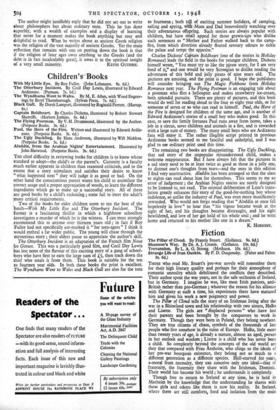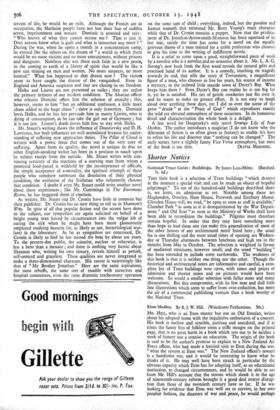Fiction
8s. 6d.)
THOSE who read Mr. Stuart's pre-war novels will remember them for their high literary quality and perhaps for their atmosphere of romantic unreality which debilitated the conflicts they described. Their author spent the war years, not in the safe seclusion of Ireland, but in Germany. I imagine he was, like most Irish patriots, anti- British rather than pro-German • whatever the reason for his alliance with Germany at such a time, his experiences there have matured him and given his work a new poignancy and power.
The Pillar of Cloud tells the story of an Irishman living after the war in a Rhineland town and his relationship with two sisters, Halka and Lisette. The girls are " displaced persons " who ihave lost their parents and been brought by the conquerors to work in Germany. Though they were born in Poland, they belong nowhere. They are true citizens of chaos, symbols of the thousands of lost people who live somehow in the ruins of Europe. Halka, little more than twenty years of age is already a mature, almost an aged, person in her outlook and wisdom ; Lisette is a child who has never been a child. So completely beyond the concepts of the old world are they that compared with Frau Arnheim, who clings to the ideals of her pre-war bourgeois existence, they belong not so much to a different generation as a different species. Half-starved for years, a-moral from necessity, they can conceive only one ideal—that of fraternity, the fraternity they share with the Irishman, Dominic. Their world has become his world ; he understands it completely.
Though free to return to Ireland at any time, he is held in Marheim by the knowledge that the understanding he shares with these girls and others like them is now his reality. In Ireland, where there are still comforts, food and isolation from the main stream of life, he would be an exile. Although the French are in occupation, the Marheim people have not lost their fear of sudden arrest, imprisonment and torture. Dominic is arrested and says : " Who knows of what they cannot accuse me ? That is just it. Does anyone know what is guilt and what is innocence any more ? " During the war, when he spent a month in a concentration camp, he existed like the others on the dream of " a world in which there would be no more victims and no more executioners, without prisons and dungeons. Nowhere else was there such faith in a new peace, in the coming to earth of a liberty of spirit that would be like a new sun -shining on men and women. No more suspects, no more' hunted." What has happened to that dream now ? The victors seem to have caught the disease of - the vanquished. Even in England and America suspicion and fear are closing-in on freedom.
Halka and Lisette are not presented as exiles • they are rather the primary initiates of our modern condition. _Te Alsatian officer who releases Dominic offers him the solution of anarchy ; this, however, seems to him " but an additional confusion, a little more chaos added to the huge chaos" ; there is only fraternity. -Dominic loves Halka, and he lets her persuade him to marry Lisette, who is dying of consumption, so he can take the girl out of Germany ; but A is too late. Lisette's death leaves him free to stay with Halka.
Mr. Stuart's writing shows the influence of Dostoievsky and D. H. Lawrence, but both influences are well assimilated because his under- standing of suffering now approaches theirs. The Pillar of Cloud is written with a poetic force that comes out of the very core of suffering. Apart from its quality, the novel is unique in that no other English-speaking writer has been in a position to touch upon its subject except from the outside. Mr. Stuart writes with con- vincing certainty of the reactions of a starving man from whom a promised food-parcel is withheld by the incompetence of officials, the 'simple acceptance of a-morality, the spiritual triumph of these people who somehow surmount the desolation of their physical condition, the evolution of the Irishman who voluntarily chooses that condition. I doubt if even Mr. Stuart could write another novel about these experiences - like Mr. Cummings in The Enormous Room, he has beggared them of emotion.
As writers, Mr. Stuart and Dr. Cronin have little in common but their publisher. Dr. Cronin has no new thing to tell us in Shannon's Way. In spite of all that popular fiction and the screen have done to the subject, our sympathies are again solicited on behalf of a bright young man forced by circumstances into the vulgar job of curing the sick when he might have been more glamorously employed studying bacteria (or, as likely as not, bacteriological war- fare) in the laboratory. As far as sympathies are concerned, Dr. Cronin is likely to find he has missed the boat by about ten years. To the present-day public, the scientist, nuclear or ,otherwise, is less a hero than a menace ; and there is nothing very heroic about 'Shannon who, writing his own history, reveals himself as pettish, self-centred and graceless.. These qualities are never integrated to make 'a three-dimensional character. His career is surprisingly like that of "My Brother Jonathan." Here are the same aspirations the same rebuffs, the same sort of trouble - with careerists and hospital committees, even the same dramatic tracheotomy operation on the same sort of child ; everything, indeed, but the passion and human warmth that animated Mr. Brett. Young's main character while that of Dr. Cronin remains a puppet. Now that the predica- ment of Dr. Jonathan-Arrowsmith-Shannon has been squeezed of its last tear, surely the time •has come for a novel on the equally grievous theme of a man trained for a noble profession who chooses to give his time to the writing of indifferent novels.- It is a relief to come upon a good, straightforward piece of work by a novelist who is a novelist and no nonsense about it. Mr. L. A. G. Strong's new book froth the first word reveals the natural gifts and practised hand of its author. It is a comedy, touching on tragedy towards its end, that tells the story of Trevannion, a magnificent figure of a man, who chooses to live for years, his source of income a mystery, in the isolated little seaside town of Dycer's Bay. What keeps him there ? Even Dycer's Bay can realise he is too big for it, yet he is satisfied. His, net, of gentle crookeries just fits over it, and he wants to make no greater effort. It is not easy to laugh aloud over anything these days, yet I did so over the scene of the great " drunk " at the " Peace of God " which reproduces exactly the wild yet elevated atmosphere of these occasions. In its humorous detail and characterisation the whole book is a delight. - A last word for Ouspensky's only novel Strange Life of Ivan Osokin. The author introduces a magician (I do not know why the dilettante of fiction is so often given to fantasy) to enable his hero to relive his life and discover that "nothing can be changed." The early scenes have a slightly funny Vice Versa atmosphere, but most



































 Previous page
Previous page